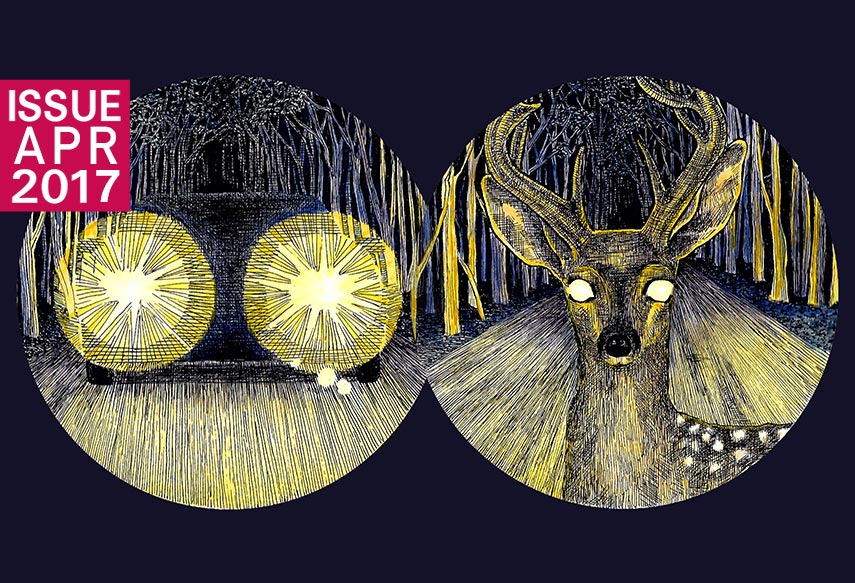Looking for new entry points into the latest issue of the journal? The section editors of this behemoth cash of international literature, out just last week, are here to guide you!
In this spring issue, the drama section features two complementary pieces—one from Catalonia and the other from Poland. Both portray hellish, nightmarish worlds in a distinct, unique theatrical manner. Grzegorz Wroblewski’s The New Colony in translation by Agnieska Pokojska depicts a claustrophobic asylum where patients/citizens live out their days in a state of restless, mocking unease. Wroblewski’s text is typical of what has been deemed “post-dramatic” theatre (in Hans Lehmann’s terms). It is an open text which offers its audience an intentionally disorientating roadmap to a contemporary world that is fractured and broken, where individuals seek wholeness despite all signs that such a search is hopeless.
Written as a proto-feminist cabaret, Beth Escudé i Gallès’s Diabolic Cabaret in translation by Phyllis Zatlin, looks at an elemental Eve, channeling visions of historical female icons throughout history. Is guilt a woman? To whom will society place its blame in times of war? Helen of Troy? Other alluring, bewitching sirens up to no good? Escudé i Gallès teases and cajoles her audience in a piece that through anarchic humor questions the roles we all play to claim concepts of territory, identity, and ownership. Both Wroblewski and Escudé I Gallès are from the same generation, even though they represent different cultures and sensibilities as dramatists. It’s fascinating to see two skilled and provocative playwrights, in fine translations, address states of fear and anxiety all too prevalent in the modern world.
—Drama Editor Caridad Svich
Among three exceptional essays—including one that introduces readers to the brilliant but tortured Swiss writer, Hermann Burger, and another that briefly loiters at the fork in Iran’s contemporary literary scene—I found myself particularly drawn to Noh Anothai‘s generous and intimate reflections on a world turned akimbo, seen through the eyes of Thai poet, Saksiri Meesomsueb. As we follow Anothai through the pages of Meesomsueb’s award-winning collection, That Hand is White, and from north Bangkok to Chicago and back, I’m reminded once more of literature’s gift in transgressing borders, its necessary lucidity, kindness, and prescience; and consequently, its call for response. Only with clean hands can we clean the world, Meesomsueb tells us. Dear Reader, what will you do next?
—Writers on Writers Editor Ah-reum Han
For the new issue, Adrian Nathan West reviews Crude Words: Contemporary Writing from Venezuela, edited by Montague Kobbé, Katie Brown, and Tim Girven for the independent Ragpicker Press in London. At over 500 pages, this long overdue anthology is divided into five parts: sex, death, travel, Caracas, and the state of the country. It begins to give readers of English some idea of the wealth of new writing coming out of Venezuela, as well as a portrait of a country with a “tenuous connection to wealth and dignity gutted by forces from without.” With his characteristic discernment and incisiveness, our longstanding Contributing Editor, Adrian, gives the book a glowing recommendation: “gripping from beginning to end.”
—Criticism Editor Ellen Jones
In the Spring Issue, Tul’si Bhambry has a wonderful translation of an excerpt from Bartek Sabela’s book about the Western Sahara, Every Grain of Sand. It vividly conveys the struggles of the Sahrawi people against Moroccan oppression, and beautifully captures the life of one man, Hamza, who finds meaning in poetry, though it cannot be written down or performed…
—Nonfiction Editor Joshua Craze
Kambiz Derambakhsh is an important Iranian cartoonist whose work is not only very funny but also poetical and philosophical. The hero of his comic “Literary Series” is a stooped, blank-faced character accompanied by inks and books that seem to have lives of their own. Much like Charlie Chaplin’s tramp character who, despite his best efforts, misconstrues social cues, Derambakhsh’s character blithely makes his way, restoring his vision with ink drops instead of eye drops, or confounding airport security with quill and ink bottle. Poupeh Missaghi, Asymptote’s Editor-at-Large for Iran, caught up with the artist in a Tehran café to discuss the art and politics of cartooning.
—Visual Editor Eva Heisler
I linked up with artist and poet Jen Bervin after last month’s Shanghai Literary Festival for a wide-ranging conversation about her interdisciplinary practice. What I admire most about her work is its resistance to the delimiting of the imagination. For Bervin, whose recent projects include a poem narrated from the perspective of a silkworm and inscribed nano-scale on a silk film biosensor, nothing falls beyond the artistic pale. Generic and formal lines in the sand be damned, her practice shows that the spheres of art, poetry, and technology are better off interwoven than arbitrarily kept at arm’s length from one another. Her current project centers on a fourth century poem by a Chinese woman named Su Hui.
On the common ground between Su Hui and Emily Dickinson, whose manuscripts Bervin published in full-color facsimile in The Gorgeous Nothings (2013, New Directions): “They are both formal innovators. Even though Su Hui’s structure is more formally rigid, fixed, they both have found a way within their poetic composition to create forms of infinite reading. With Dickinson, it’s the variants—the words preceded by crosses, corresponding to alternate words preceded by crosses within the structure of the poem. If you start to read Dickinson through the variant system and retain the variant ghosts in your readings, you experience what feels like an infinite system—you encounter the echoes of variance in a way that is thrilling in its complexity.”
— Interviews Editor Henry Ace Knight
*****
Read More from the Editors:

